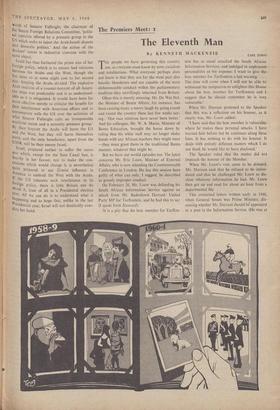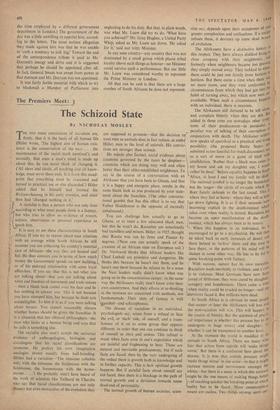The Premiers Meet: 2
The Eleventh Man
By KENNETH MACKENZIE CAPE TOWN THE people we have governing this country are, as everyone must know by now, racialists and totalitarians. What everyone perhaps does not know is that they are for the most part also bucolic blunderers and are capable of the most dishonourable conduct within the parliamentary tradition they unwillingly inherited from Britain.
Often this is merely amusing. Mr. De Wet Nel, the Minister of Bantu Affairs, for instance, has been causing many a merry laugh by going round and round the country these last few weeks say- ing: Our race relations have never been better.' And his colleague, Mr. W. A. Maree, Minister of Bantu Education, brought the house down by ruling that his white staff may no longer shake hands with any African teachers they might meet —they must greet them in the traditional Bantu manner, whatever that might be.
But we have our sordid episodes too. The latest concerns Mr. Eric Louw, Minister of External Affairs, who is now attending the Commonwealth Conference in London. He has this session been guilty of what can only, I suggest, be described as grossly improper conduct.
On February 26, Mr. Louw was defending his South African Information Service against an attack from Mr. Badenhorst Durrant, United Party MP for Turffontein, and he had this to say (I quote from Hansard): 'It is a pity that the hon. member for Turffon- tein has as usual attacked the South African Information Services, and indulged in unpleasant- personalities at my expense. I want to give the hon. member for Turlfontein a last warning.,. . . The time will come when I will not be able to withstand the temptation to enlighten this House about the hon: member for Turffontein and I suggest that he should remember he is very vulnerable.'
When Mr. Durrant protested to the Speaker that this was a reflection on his honour, as it clearly was, Mr. Louw Added: 'I have said that the hon. member is vulnerable where he makes these personal attacks. I have warned him before but he continues along these lines. It has nothing to do with his honour. It • deals with entirely different matters which I do not think he would like to have disclosed.'
The Speaker ruled that the matter did not impeach the honour of the Member.
When Mr. Louw's vote came to be debated, Mr. Durrant said that he refused to be intimi- dated and that he challenged Mr. Louw to dis- close whatever information he had. Mr. Louw then got up and read for about an hour from a departmental file.
This contained letters written early in 1948, when General Smuts was Prime Minister, dis- cussing whether Mr. Durrant should beappointed to a post in the Information Service. (He was at the time employed by a different government department in London.) The government of the day was a little unwilling to appoint him, accord- ing to the letters. The most serious allegation They made against him was that he was unable to 'curb a tendency to talk big.' Toward the end of the correspondence tribute is paid to Mr. Durrant's energy and drive and it is suggested that perhaps he should be appointed after all. In tact, General Smuts was swept from power at that moment and Mr. Durrant was not appointed.
It was fairly feeble material with which to try to blackmail a Member of Parliament into neglecting to do his duty. But that, in plain words, was what Mr. Louw did try to do. 'What have you achieved?' Mr. Gray Hughes, a United Party Whip, asked as Mr. Louw sat down. 'He asked• for it,' said our witty Minister.
In any sane country—any country that was not dominated by a small group which places tribal loyalty above such things as honour—no Minister could survive such a performance. But our little Mr. Louw was considered worthy to represent the Prime Minister in London.
All that can be said is that there are a 'large number of South Africans he does not represent.







































 Previous page
Previous page